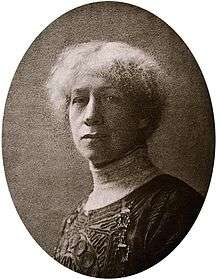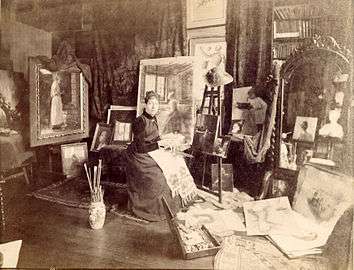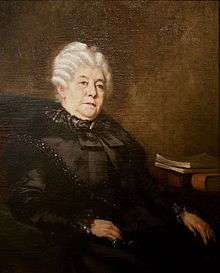Anna Elizabeth Klumpke
| Anna Elizabeth Klumpke | |
|---|---|
 | |
| Born |
October 28, 1856 San Francisco, California |
| Died |
February 9, 1942 (aged 85) San Francisco, California |
| Resting place | Père Lachaise Cemetery, Neptune Society Columbarium |
| Nationality | American |
| Education | Académie Julian |
| Known for | Genre works, painting |
Anna Elizabeth Klumpke (October 28, 1856 – February 9, 1942), was an American portrait and genre painter born in San Francisco, California, United States. She is perhaps best known for her portraits of famous women including Elizabeth Cady Stanton (1889)[1] and Rosa Bonheur (1898).[2]
Life and career
Anna's father, John Gerald Klumpke, born in England[3] or Germany,[4] was a successful and wealthy realtor in San Francisco. Her mother was Dorothea Mattilda Tolle. Anna was the eldest of eight children, five of whom lived to maturity. Among her siblings were the astronomer Dorothea Klumpke-Roberts, the violinist Julia Klumpke, and the neurologist Augusta Déjerine-Klumpke. At age three, Anna fell and suffered a fracture of her femur. She fell again at age five and suffered osteomyelitis with purulent knee arthritis. These problems handicapped her, and her mother went to extraordinary lengths to find a remedy by taking Anna and three of her siblings to Berlin for treatment by Dr. Bernhard von Langenbeck.
The treatment lasted 18 months and included thermal baths at Kreuznach. Unfortunately, it was not successful, and Anna remained hobbled all her life. While they were in Europe, her mother ensured that her children received excellent tutoring.

The time away in Europe strained the Klumpkes' relationship. When Anna was fifteen, her parents divorced. She and her siblings (now numbering five) moved with their mother to Göttingen, Germany, where they lived for a time with Mattilda's sister, who had married a German national. Anna and her sister Augusta were sent to school at Cannstatt, near Stuttgart. When she was seventeen, the family moved to Clarens, near Lake Geneva in Switzerland where she spent two years in a boarding school.
Anna studied art at home for the next few years, and in October 1877, moved with her family once more to Paris, where she was later enrolled in the Julian Academy (1883–1884), under the tutelage of Tony Robert-Fleury and Jules Lefebvre. She spent many an hour copying paintings in the Musée du Luxembourg, including Rosa Bonheur's Ploughing in the Nivernais.[5][6] At one point, she also studied under Vuillefroy. She presented her first work at the Paris Salon in 1884, while still at the Academy, and she won the grand prize for outstanding student of the year. She exhibited regularly at the Salon for several more years. After completing her studies, she returned to the United States for a few years and taught in Boston. However, by 1889, she was back in Paris.
As a girl, Anna had been given a "Rosa" doll, styled after the French animal painter Rosa Bonheur—so famous at the time that dolls were made in her image. From early childhood, Anna had been fascinated and inspired by the woman artist.[7]
Intent on painting Bonheur's portrait, she met Rosa Bonheur on October 15, 1889, under the pretext of being the interpreter for a horse dealer. The two women were soon living together at Bonheur's estate in Thomery, near Fontainebleau, and their relationship endured until Bonheur's death in 1899.[2]
Klumpke was named as the sole heir to Bonheur's estate and oversaw the sale of Bonheur's collected works in 1900. She founded the Rosa Bonheur Prize at the Société des Artistes Français and organized the Rosa Bonheur museum at the Fontainebleau palace.
Klumpke was a meticulous diarist, publishing in 1908 a biography of Bonheur, Sa Vie Son Oeuvre, based on her own diary and Bonheur's letters, sketches and other writings. In the book, which was not published in English until 1998, Klumpke told the story of Bonheur's life and related how she had met Bonheur, how they had fallen in love, and how she had become the artist's official portraitist and companion.
Klumpke exhibited her work at the Palace of Fine Arts and The Woman's Building at the 1893 World's Columbian Exposition in Chicago, Illinois.[8]
Following Bonheur's death, Klumpke divided her time between France, Boston, and San Francisco, finally settling in San Francisco in the 1930s. During World War I, with her mother, she established a military convalescent hospital at her home in Thomery.
In 1940, at the age of 84, Klumpke published her own autobiography Memoirs of an Artist. She died in 1942 at the age of 86 years in her native San Francisco.[7] A memorial to her is at Neptune Society Columbarium, San Francisco, and she is buried alongside Rosa Bonheur at Père Lachaise Cemetery, Paris.
Style
Anna Klumpke was primarily a genre painter, often painting pastoral scenes featuring static figures, usually female. Her painting, Catinou Knitting, was exhibited at the Paris Salon in 1887. This sentimental image proved highly popular in reproduction and is still sold in hand-painted copies.
Notable works
| Piece | Year | Format | Owner | Image |
|---|---|---|---|---|
| Catinou Knitting | 1880 | oil | Livingston, Estelle G. (Mrs Charles W.), Kensington, CA | -- |
| Seated Woman with a Red Kerchief | 1886 | -- | -- | .jpg) |
| In the Wash-house | 1888 | oil on canvas painting laid to wood | Pennsylvania Academy of the Fine Arts, Philadelphia, PA | |
| Elizabeth Cady Stanton | 1889 | oil on canvas | Smithsonian Institution, National Portrait Gallery, Washington, DC |  |
| Girl with Cat | 1890 | pastel | Barker, Joy L., Novato, CA | -- |
| Child with a Doll | 1891 | pastel | Administered by United States Department of the Interior, National Park Service, Washington, DC. Located at the Longfellow National Historic Site, Cambridge, Massachusetts | -- |
| Girl in a Field | 1893 | pastel | Sotheby Parke Bernet, New York, NY | -- |
| Portrait of Miss Mary Sophia Walker | 1895 | oil on canvas | -- | -- |
| Portrait of Rosa Bonheur | 1898 | pastel on paper | -- | -- |
| Rosa Bonheur - painting | 1898 | oil on canvas | Metropolitan Museum of Art, New York, NY[9] | .jpg) |
| Among the Lilies | 1909 | oil on canvas | Fine Arts Museums of San Francisco, Palace of the Legion of Honor, San Francisco, CA | -- |
| Portrait of the Violinist Goby Eberhardt | 1911 | painting | Museen für Kunst und Kulturgeschichte der Hansestadt Lübeck, Behnhaus Museum, Lubeck, Germany | -- |
| The Artist's Father | 1912 | oil on canvas | Fine Arts Museums of San Francisco, M. H. de Young Memorial Museum, San Francisco, CA | -- |
Honours include
- Silver medal of the ‘Reconnaissance Française’ (France)
- 1889 - Temple Gold Medal, for In the Wash-House, Pennsylvania Academy of the Fine Arts
- Légion d’honneur (France 1924)
Publications
- Anna Klumpke, A Turn-of-the-Century Painter and Her World Britta C Dwyer, 1999
- Sa Vie Son Oeuvre (1908), published in English as Rosa Bonheur: The Artist's (Auto)Biography (Gretchen van Slyke, translator), 1998
- Memoirs of an Artist Boston: Wright and Potter Printing Company, 1940
References
| Wikimedia Commons has media related to Anna Elizabeth Klumpke. |
- ↑ "American Art: Lesbian, Nineteenth Century" Archived November 23, 2005, at the Wayback Machine., glbtq, Inc.
- 1 2 "The Portrait That Forged a "Divine Marriage" Between Two 19th-Century Women Painters". Hyperallergic. 2018-04-16. Retrieved 2018-04-19.
- ↑ Bogousslavsky, J (2005). "The Klumpke family--memories by Doctor Déjerine, born Augusta Klumpke". European Neurology. 53 (3): 113–20. doi:10.1159/000085554. PMID 15860915.
- ↑ David Rogers, "John Klumpke's "Homestead" on Pine Ridge", The Double Cone Quarterly, Spring Equinox 2000, Volume III, Number 1
- ↑ Waters, Clara Erskine Clement (1904). Women in the fine arts: from the seventh century B.C. to the twentieth century A.D. Houghton, Mifflin and Company. p. 197. Retrieved 26 January 2015.
- ↑ "Letters and Art: Anna Klumpke". Public Opinion. 29 (11). 1900. p. 340. Retrieved 26 January 2015.
- 1 2 Lawrence J. Cantor & Company, "Anna Elizabeth Klumpke, (1856–1942)"
- ↑ Nichols, K. L. "Women's Art at the World's Columbian Fair & Exposition, Chicago 1893". Retrieved 13 August 2018.
- ↑ "Rosa Bonheur". Metropolitan Museum of Art.